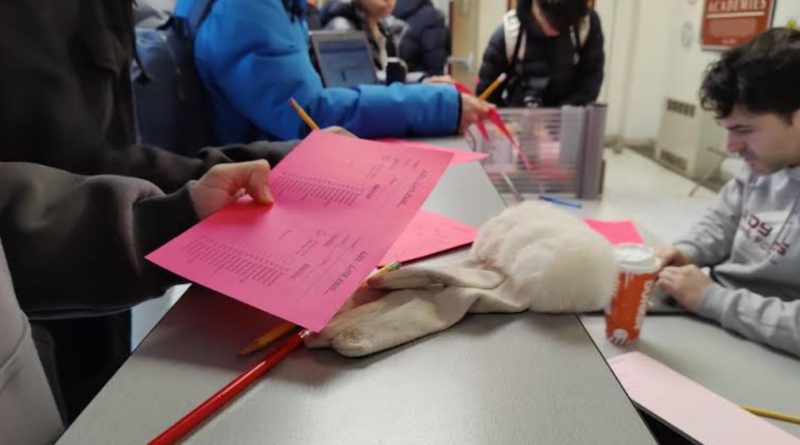Late Pass? I’ll Pass.
Although the final Zoom classes of the COVID-19 pandemic were dismissed over four years ago, virtual school fundamentally changed the relationship between technology and learning. Chromebooks, SMART Boards, and digital tools—Google Classroom, AP Classroom, ClassLink, DeltaMath, Edpuzzle, NoodleTools, etc.—have sprung to the forefront of modern education. During the 2023–2024 school year, Leonia High School began using Minga to digitize hall passes and student IDs. This school year, the administration has doubled down, adjusting the schedule to accommodate twenty-five minute “Flex Periods” through Minga, experimenting with Brisk Teaching’s AI assistant, and acquiring multiple virtual reality headsets and related software.
Amidst Leonia High School’s expansive campaign to re-engineer pedagogical and operational standards from the pre-pandemic era, the late pass system remains a bizarre and costly anachronism. Every morning until 7:50, students arrive, scan their IDs, and walk to class. But once the late bell rings, a crowd envelops the front desk as students are required to write their name and time of arrival—both of which are logged by the ID scanners—on two identical columns of a pink slip of paper and present it to a teacher on duty. The teacher will then access the student’s online profile, tally the student’s tardy count for the marking period on both columns of the paper, and rip it in half—one half is handed to the student, the other is later delivered to the main office. Only once this ritual is complete is the student allowed to class.
Students who arrive one minute late to school may end up five or ten minutes late to class because of the late pass system. Even students who arrive on time to school but slightly late to class may be sent back to the front desk, where a crowd will have surely formed. The late pass system, in conjunction with Leonia High School’s late policy—which treats lateness of one minute and twenty minutes equally—also enables students to loiter around the front desk until 8:10 before obtaining a pass and heading to class.
The administration is aware of the regular delays caused by the late pass system. For a time, just one teacher was assigned to the front desk, before severe hold ups necessitated a second. Still, late students typically overwhelm teachers, especially during disruptive weather or traffic events. On multiple occasions, the main office has been forced to shoulder the responsibility of writing late passes.
Yet writing late passes may be less costly (on an individual level) than actually processing them. Ms. Sharon Biondi, who works in the main office, said in an interview that on most days she spends anywhere from an hour and a half to two hours updating tardy students’ attendance statuses, sifting through seventy-five to eighty late passes. Sometimes, tardy students go to class without making a late pass but their teachers fail to send them back. When this happens, Ms. Biondi must call in on the loudspeaker to confirm they are present.
Minga—which the school already uses to manage hall passes—and Securly—which the school already uses to monitor Chromebooks—both sell tardy management systems. But according to Ms. Biondi, there are no plans in place to digitize the late pass system. In fact, Ms. Biondi opposes digitizing tardy management, because the ID scanners are “not at all” consistent and “[n]ot all kids scan in.”
Still, it would seem the late pass system could be improved. From what I know, the ID scanners are inconsistent only because many students carelessly wave their IDs without checking to see if they really scanned. Regardless, if the ID scanners are “not at all” consistent, why keep them? (An especially astute observer might ask, why buy them?) As an alternative to scanning, the front desk already provides several laptops for students to type their eight-digit IDs into. Why not standardize that? Tardy students might still go to class without typing their IDs, but there is no reason to believe this would occur on any greater scale than it occurs presently (there is, in fact, reason to believe the problem would be diminished due to the comparative simplicity of typing eight digits).
The Leonia School District invests heavily in educational technology. A “Tech Upgrade,” to which $354,975 will be paid this school year, represents the district’s largest ongoing capital financing agreement [1]. Meanwhile, approximately $619,106 in undistributed operating expenditures will be allocated towards information technology in 2024–2025, compared to $550,164 in 2023–2024 [2]. But spending would be superfluous to improve Leonia High School’s late pass system. By simply ditching physical slips and ID scanners for our existing laptops, we could free students, teachers, and the main office to pursue more enriching activities than writing and processing late passes.
Sources:
[1] https://4.files.edl.io/9586/05/02/24/184121-afa655d4-9e11-41ee-981d-256a7f1baff5.pdf
[2] https://4.files.edl.io/0159/05/15/25/190315-69ff664b-cbeb-4323-87e6-f956703cd44f.pdf

